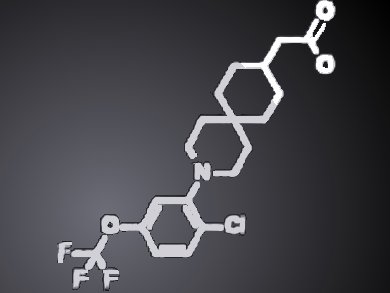Omega–3 fatty acids are healthy dietary elements abundant in fish. These acids exert potent anti-inflammatory effects and increase the sensitivity to insulin, a hormone regulating glucose uptake from the blood circulation. These effects are elicited following binding to Grp120, a lipid sensing protein. Thus, the pharmacological stimulation of this molecule is a promising strategy to control inflammation and metabolic diseases. Nevertheless, this task is challenging because Grp120’s structural homology to Grp40, another member of the same protein family, limits the development of specific agonists.
Jerrold Olefsky, University of California, San Diego, USA, and colleagues report a way around this issue. The researchers demonstrated that compound A (pictured) is a selective, high-affinity, orally available Gpr120 agonist. When testeted in vitro, this compound exerted potent anti-inflammatory effects. Moreover, when it was administered to obese mice, it increased their sensitivity to the action of insulin.
Compound A could, thus, become a new insulin-sensitizing drug for the treatment of insulin-resistant syndromes such as diabetes.
- A Gpr120-selective agonist improves insulin resistance and chronic inflammation in obese mice,
Da Young Oh, Evelyn Walenta, Taro E. Akiyama, William S Lagakos, Denise Lackey, Ariane R Pessentheiner, Roman Sasik, Nasun Hah, Tyler J. Chi, Jason M. Cox, Mary Ann Powels, Jerry Di Salvo, Christopher Sinz, Steven M. Watkins, Aaron M. Armando, Heekyung Chung, Ronald M. Evans, Oswald Quehenberger, Joanne McNelis, Juliane G. Bogner-Strauss, Jerrold M. Olefsky,
Nature Med. 2014.
DOI: 10.1038/nm.3614




